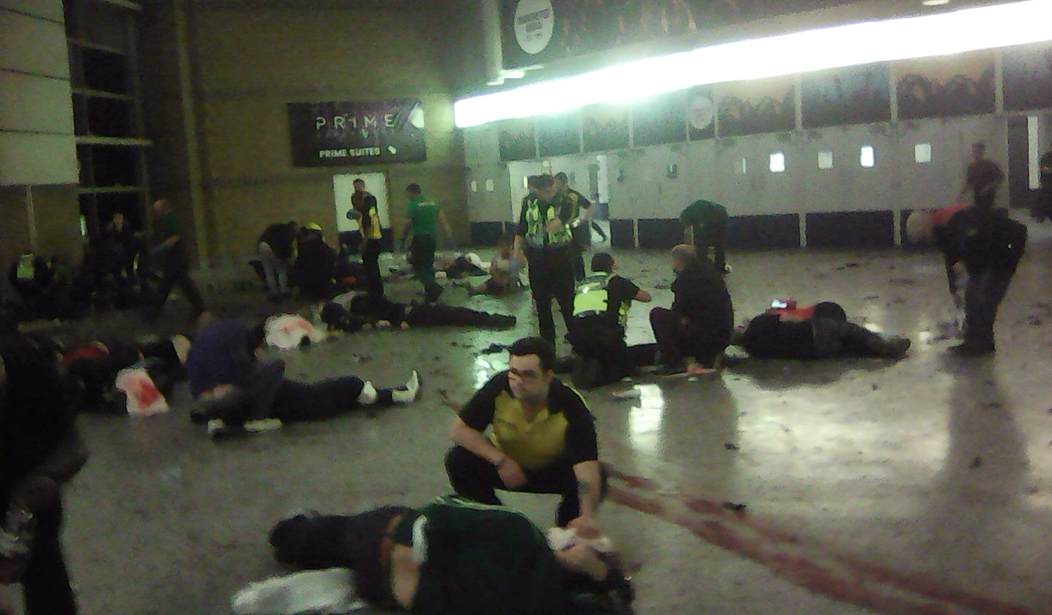While claiming responsibility for the suicide bombing of an Ariana Grande concert in Manchester, England, on Monday night, the Islamic State (ISIS) issued a cryptic warning about further attacks.
“What is coming is tougher and worse for the worshippers of the Cross and their helpers, Allah permitting,” the ISIS statement concluded, forebodingly. This translation of the message, sent in Arabic, was provided by Rukmini Callimachi, a correspondent for The New York Times focusing on al-Qaeda and ISIS, who spent seven years in West Africa with the Associated Press.
2. The bulletin which was released in multiple languages calls the attacker "a soldier of the Caliphate," their term for their fighters pic.twitter.com/pMTQXUNEnW
— Rukmini Callimachi (@rcallimachi) May 23, 2017
This extremely religious warning might just fit ISIS hyperbolic style (the statement described the Ariana Grande concert as “a gathering of Crusaders”), but this past December, the Islamic State released a list of churches to target on “Christian New Year,” which could have referred either to Christmas or New Year’s Day.
Shortly after news broke of the existence of this list, the FBI and the Department of Homeland Security issued a bulletin describing the ISIS list as authentic but acknowledging that there were no concrete, credible threats.
Especially following the Palm Sunday attacks on churches in Egypt and other attacks on churches in that country, it stands to reason that this ISIS threat might be church-specific.
Here is the full message, according to Callimachi’s translation.
With guidance from Allah, and by His grace, and in revenge for the religion of Allah, Glorified and Exalted be He, and in order to terrorize the polytheists, and in response to their transgressions against the homes of the Muslims, one of the soldiers of the Caliphate was able to place explosive devices amidst a gathering of Crusaders in the British city of Manchester. He detonated the devices in an arena for a profligate concert, which resulted in killing nearly 30 Crusaders and wounding 70 others. What is coming is tougher and worse for the worshippers of the Cross and their helpers, Allah permitting. Praise be to Allah, the Lord of the Worlds.
ISIS refers to “polytheists,” “Crusaders,” and “worshippers of the Cross” as enemies of Allah.
The reference to “polytheists” traces back all the way to the prophet Mohammed and early Islam. Polytheism, along with Judaism and Christianity, was prevalent in Arabia at the time of Mohammed. Eventual Islamic law treated polytheists more harshly than Jews or Christians, who are known as “people of the book.” While Jews and Christians were allowed to live under Muslim rule so long as they submitted and paid a special tax, polytheists had to convert or be killed.
The mention of “Crusaders” is a novel invention. Most Muslims had not considered the Crusades an important period in their history, but rather a brief blip on the radar of Islamic rule. But following the Iraq War, the term has been widely used to refer to Americans and their allies, who were seen as unlawful invaders in Muslim lands.
As for “worshippers of the Cross,” it could be synonymous with “Crusaders” and merely a reference to Westerners. But it could also mean Christians specifically, and therefore be a threat to churches. Given recent attacks in Egypt and threats online late last year, this interpretation makes sense.
Radical Islamic terrorists view Christians as enemies and consider the American military to be a “Crusader” force. While the sporadic terror attacks in the West have so far not damaged churches, police in Australia last year detained five men suspected of planning Christmas Day bomb attacks in the city of Melbourne, one of which explicitly targeted St. Paul’s Cathedral.
Perhaps even more terrifying is Callimachi’s explanation that even if ISIS had no contact with the attacker, the Islamic State “considers inspired attacks to be part of core strategy.” While terrorists may not have explicit orders from ISIS, they may execute plans knowing that ISIS will valorize them after the fact.
10. What's not divulged is whether ISIS had contact with the attacker. Remember ISIS considers inspired attacks to be part of core strategy
— Rukmini Callimachi (@rcallimachi) May 23, 2017
This means real lone wolves, or more of these “known wolves,” as PJ Media’s Patrick Poole calls them, may continue to be inspired by these attacks.
If churches are attacked, Christians should take courage from the example of a widow who lost her husband in the Palm Sunday bombing of churches in Egypt. “I’m not angry at the one who did this,” the widow said, with children by her side, in an interview on Egypt’s ONTV.
“I’m telling him, ‘May God forgive you, and we also forgive you. Believe me, we forgive you. You put my husband in a place I couldn’t have dreamed of. Believe me, I am proud of him. And I wish I was there beside him,'” the widow declared.
Television host Amr Adeeb was speechless after hearing this. “The Copts of Egypt are made of steel!” Adeeb said after 10 seconds of silence. “If it were my father, I could never say this. These people have so much forgiveness. But this is their faith and religious conviction. These people are made from a different substance.”








Join the conversation as a VIP Member